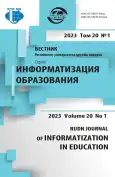Peculiarities of using virtual whiteboards to form the professional competence of future lawyers in foreign language classes at university
- 作者: Nikulina E.G.1, Kibishev A.N.1, Gribkov D.N.2
-
隶属关系:
- Vyatka State University
- Orel State Institute of Culture
- 期: 卷 20, 编号 1 (2023)
- 页面: 93-103
- 栏目: EVOLUTION OF TEACHING AND LEARNING THROUGH TECHNOLOGY
- URL: https://journal-vniispk.ru/2312-8631/article/view/321291
- DOI: https://doi.org/10.22363/2312-8631-2023-20-1-93-103
- EDN: https://elibrary.ru/CRBFCN
- ID: 321291
如何引用文章
全文:
详细
Problem statement . The focuses of the current digital intercultural learning environment as training programs for professionals in the legal industry specify their developing of systemic foreign language communication skills, skills to analyze which can be based on information technologies and actualized in rapidly changing professional tasks. The study is aimed at substantiating the effectiveness of using virtual whiteboards to form the professional competence of future lawyers in foreign language classes at university. Methodology . The analysis of theory and methodology, generalization of crucial scientific papers on the studied problem, processing of results and creating interactive whiteboards are applied. The pedagogical experiment involved 97 students (girls - 48%, boys - 52%) of the Law Institute of Vyatka State University. Fisher's criterion (angular transformation) is used as a statistical processing method. Results . The didactic peculiarities of making use of virtual whiteboards when forming professional and legal competence of a professional in the legal industry during foreign language classes are stated: the capabilities of network intercultural cooperation when solving tasks in the legal industry; seeking legal assistance; foreign language communication; virtual discussion of criminal acts; independence of the interactive network environment for modeling legal processes; keeping the results in a cloud. At the control stage of the experiment, statistically significant differences between the levels of formed competences of the participants of the experimental and control groups were revealed. Conclusion . Making use of whiteboards will contribute to the formation of foreign language and professional legal competences of a specialist while providing a set of circumstances: active work with foreign regulatory acts in English, showing students new intercultural information collaboration and legal consultancy, combining different types of work, organizing foreign language feedback, solving real practical legal tasks.
作者简介
Ekaterina Nikulina
Vyatka State University
编辑信件的主要联系方式.
Email: knikulina1982@mail.ru
ORCID iD: 0000-0002-8151-6863
Candidate of Philology, Associate Professor at the Department of Foreign Languages for Non-Linguistic Specialties
36 Moskovskaya St, Kirov, 610000, Russian FederationAndrey Kibishev
Vyatka State University
Email: kibishev@vyatsu.ru
ORCID iD: 0000-0003-0723-1728
senior teacher, Department of Foreign Languages for Non-Linguistic Specialties
36 Moskovskaya St, Kirov, 610000, Russian FederationDmitry Gribkov
Orel State Institute of Culture
Email: bibliotekar2005@mail.ru
ORCID iD: 0000-0002-3388-9526
Cand. Sci. (Educ.), Associate Professor, Head of the Department of Informatics and Records Management
15 Leskova St, Orel, 302020, Russian Federation参考
- Burnet N. UNESCO and education: what should they be? Higher Education in Russia. 2008;(11):110-119. (In Russ.) Бернет Н. ЮНЕСКО и образование: какими они должны быть? // Высшее образование в России. 2008. № 11. С. 110-119.
- Zlobina IS, Rezepova NV, Utkina NV, Sergeyeva NA, Rublova OS. Study of the influence of interactive gaming resources on the formation of scientific terminology and foreign language competence. Science for Education Today. 2020;10(3):144-163. http://doi.org/10.15293/2658-6762.2003.08
- Sadovnikova GD. Peculiarities of teaching subjects of the state law course using interactive techniques. Actual Problems of Russian Law. 2017; (2): 37-44. http://doi.org/10.17803/1994-1471.2017.75.2.037-044.
- Mania K. The digital transformation of legal industry: management challenges and technological opportunities. Danube. 2022;13(3):209-225. http://doi.org/10.2478/danb-2022-0013
- Solomon Y, Bronstein J. The information-gathering practice of liberal professionals in a workplace setting: more than just seeking information. Journal of Librarianship and Information Science. 2022;54(1):54-68. http://doi.org/10.1177/0961000621992810
- Ionova EV. Certain aspects of the methods of teaching the disciplines of the criminalistic cycle. All-Russian Criminological Journal. 2018;12(2):247-257. http://doi.org/10.17150/2500-4255.2018.12 (2).247-257
- Bhushan S. A novel digital forensic inspection model for XSS attack. 2022. http://doi.org/10.1007/978-981-19-0707-4_68
- Correa RC, Juan CAS, Rodríguez RL. Tecnología para decidir hechos en procesos judiciales. Revista Chilena De Derecho y Tecnologia. 2021;10(1):111-143. http://doi.org/10.5354/0719-2584.2021.56816
- Khan D, Rehman I, Ullah S, Ahmad W, Cheng Z, Jabeen G, Kato H. A low-cost interactive writing board for primary education using distinct augmented reality markers. Sustainability (Switzerland). 2019;11(20). http://doi.org/10.3390/su11205720
- Soboleva EV, Suvorova TN, Grinshkun AV, Nimatulaev MM. Formation of group creative thinking when working with virtual walls. European Journal of Contemporary Education. 2021;10(3):726-739. http://doi.org/10.13187/ejced.2021.3.726
- Covaci A, Ghinea G, Lin C-H, Huang S-H, Shih J-L. Multisensory games-based learning - lessons learnt from olfactory enhancement of a digital board game. Multimedia Tools and Applications. 2018;77(16):21245-21263. http://doi.org/10.1007/s11042-017-5459-2
- Hastings SO, Aponte S, Valverde E, Gristock C, Fraser R, Missigman M, Rosas L. Nonverbal communication and writing deficiencies of graduates: research by undergraduates for undergraduates. Business and Professional Communication Quarterly. 2020;83(2):204-222. http://doi.org/10.1177/2329490620906447
- Van Dijk J, Kalidien S, Choenni S. Smart monitoring of the criminal justice system. Government Information Quarterly. 2018;35(4, Suppl.):24-32. http://doi.org/10.1016/j.giq.2015.11.005
- Ivshin MS, Yurkov SA. Features of using virtual whiteboards for the formation of professionally-legal competence of a future lawyer. Perspectives of Science and Education. 2020;46(4):425-440. http://doi.org/10.32744/pse.2020.4.30
- Astapenko ЕВ, Bedareva АВ. Didactic capabilities of the MIRO virtual whiteboard and the Wordwall educational resource for organizing students ‘work in the foreign language learning process at university. Russian Journal of Education and Psychology. 2021;12(1):7-24. http://doi.org/10.12731/2658-4034-2021-12-1-7-24
补充文件









